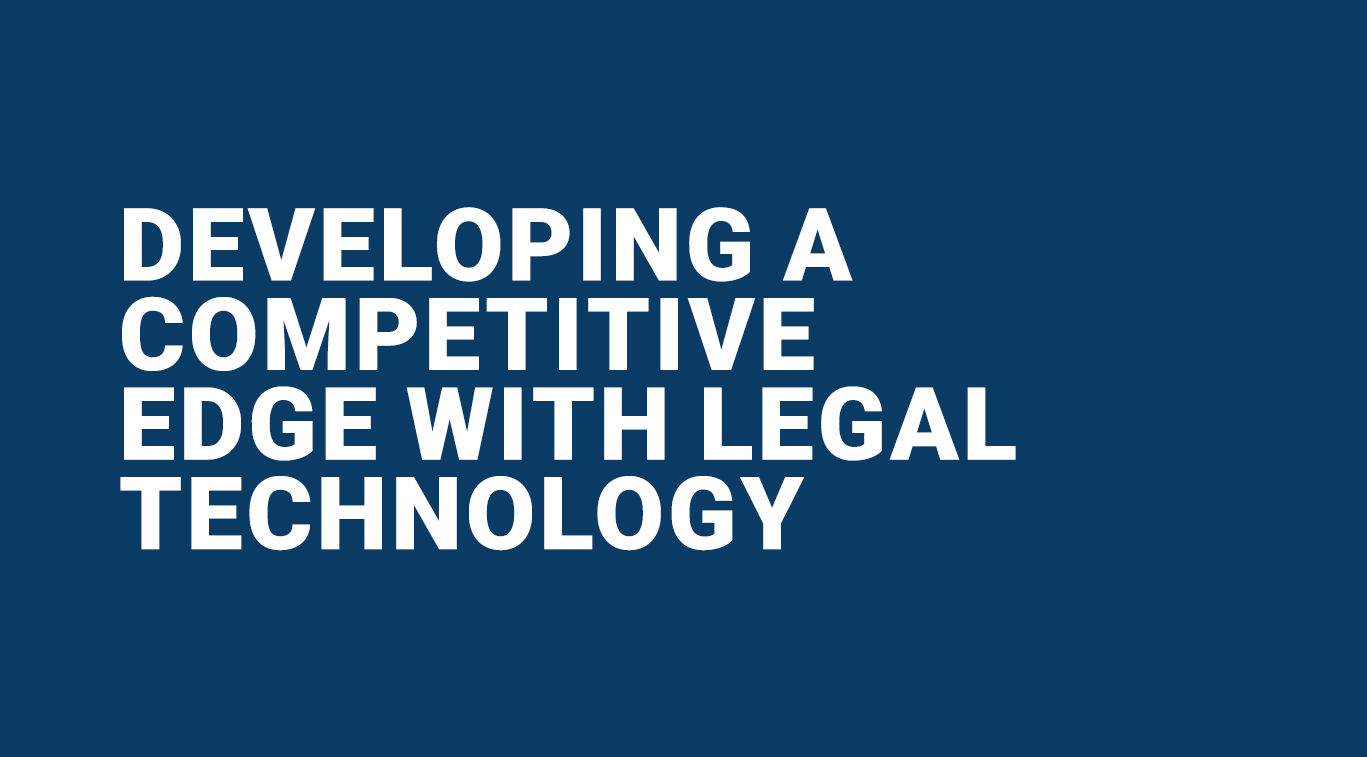Developing a Competitive Edge With Legal Technology

Written by Maryam Khan
Blogger

The need to stay competitive and raise client expectations continues to rise in the legal sector. Clients expect more value for less money and have an increasing number of options for where to take their business if they are not satisfied. Therefore, law firms must adopt new working methods and familiarize themselves with advanced technologies that transform the whole client experience. The increase in new entrants and alternative legal service providers to an already overcrowded legal market also puts pressure on law firms to develop a competitive edge [1].
What makes the legal market so competitive?
Law firms have been competing in a highly saturated market for a long time [2]. The legal market is experiencing significant changes with new competitors entering the market. New entrants who have had a significant impact include US law firms, alternative legal service providers and major accountancy firms launching legal services over recent years [3].
The Thomson Reuters’ State of the Legal market in the UK: Challenges to Growth and Sustainability report highlighted that the demand for American law firms has increased by 4.5%, making it a highly attractive market [4]. Such firms have increased their lawyer intake and are experiencing an approximately 5.8% growth in headcount [5]. US law firms are considered more attractive due to the career development prospects and higher newly qualified salaries offered, enabling them to attract talent and take up market share at the expense of local firms [6]. If a firm loses its top lawyers, it loses its expertise and clients, as nearly 27% of a fee-earner work follows them to a new firm on average [7].
The rise in alternative legal service providers and major accountancy firms launching their legal services in the past few years has also made it more difficult for law firms to compete for clients. Alternative legal service providers are simply businesses that provide legal services, including document review, legal research and e-discovery, without holding the status of a registered law firm [8]. Moreover, accountancy firms that have launched legal services, such as Deloitte Legal, envision themselves to prove a mix of high-quality legal advice with legal management consulting, legal managed services and legal technology [9]. Law firms will have to step up their game to compete with such end-to-end service providers.
How can law firms drive competitiveness?
Law firms can develop a competitive edge in many ways. This includes merging with other law firms, attracting talent by offering the best work environment, developing their brand and marketing strategy, and investing in various resources to mark themselves as a unique legal services provider that offers an innovative client experience [10]. It is common for law firms to acquire mid-tier or boutique law firms to complement their existing services or for partners to leave a law firm to set up their own practice. This often results in that lawyer taking several employees and clients with them [11]. As a result, the need to succeed in such an overcrowded market has led to an increase in legal technology investment by 713% in 2018 [12].
Moreover, succeeding in a highly competitive environment requires law firms to provide the best incentives and work environment to attract and retain the best lawyers and continuously provide greater value to grow their business and expand their client portfolio. Lastly, a crucial part of law firm business development is investing in legal technology solutions that drive efficiency and productivity. Artificial intelligence, automation and machine learning within various legal technology solutions are changing the way lawyers work and provide their services. McKinsey has predicted that up to 23% of lawyers’ time can be automated by 2025, highlighting the importance of technological investment in the legal sector [13].
The Role of Legal Technology
Digital transformation in the legal sector is critical to achieving better services for clients and increasing productivity and efficiency. Legal technology solutions have been widely used to combat issues associated with remote working and social-distancing rules in the past year. As the world is now in its post-pandemic stage, things are not going back to the way they were as technological innovations within the legal sector are gaining momentum, and their usage is becoming a norm. Incorporating legal technology has allowed law firms to compete in unprecedented times, adapt to change and become ready for the future. Investments in practice management systems, legal data analytics, electronic case management systems and matter management software have allowed law firms to provide their clients with a greater value for their money, develop their own exclusive software, conduct better market research to improve their practice, provide better client service and make themselves stronger competitors.
Greater Value For Money
Through smart contracts, case management systems, legal billing software and document management systems, low-value, repetitive tasks are automated. Clients no longer expect to pay for such tasks as proofreading, first-round document review, or contract reviews as they can be automated, reducing a firm’s billable hours [14]. This expectation is that such work now takes less time with technology. This is a reasonable expectation as law firms leveraging technology provide a cheaper, faster and better client service through the use of document management systems and legal file management software. [15].
Better Client Service
Clients are now seeing the benefits of working with a technologically advanced law firm, especially when they have incorporated technology into the workflows of their businesses. Consequently, law firms should not be ‘behind’ their clients regarding technology if they want to offer greater quality in their legal services. Therefore, closing this gap in technology is a step law firms can take to develop a stronger competitive strategy [16].
Developing Exclusive Technology
Law firms already ahead of the game in legal technology were resilient throughout the pandemic as incorporating technology into their workflow was not something new. The same future-facing law firms have now developed their own legal software highlighting the importance of investing in technology. Examples of such law firms include Womble Bond Dickinson’s WBD Advance and Allen & Overy’s Fuse. This will be a growing trend amongst UK law firms as 47% more technology-leading law firms experienced increased profitability while tech-transitioning firms and tech-trailing firms struggled [17].
Final Words
The future of the legal industry is digital. This makes investing in legal technology software is a crucial step to developing a competitive advantage and meeting changing client expectations and demands brought about by the economic uncertainty during the pandemic.
References
[1] Mike Buxton, ‘Staying Competitive in the Legal Market’, Mitchell Charlesworth at https://www.mitchellcharlesworth.co.uk/news/staying-competitive-in-the-legal-market/
[2] Sophia Gonella, ‘Competition in the UK’s Legal Market’, The Student Lawyer (2020) at https://thestudentlawyer.com/2020/08/31/competition-in-the-uks-legal-market/
[3] Ibid (1)
[4] ‘State of the Legal Market in the UK: Challenges to Growth and Sustainability’, Acritas, Legal Executive Institute at https://legalsolutions.thomsonreuters.co.uk/content/dam/openweb/documents/pdf/uki-legal-solutions/report/thomson-reuters-state-of-legal-market-in-the-uk.pdf?LastSFDCCampaignID=7014O000000vcBdQAI&utm_campaign=Demand_2020_LPE_SW_StateOf
LegalMarket_PressRelease&utm_source=Website&utm_medium=PR
[5] Ibid (4)
[6] Ibid (2)
[7] Ibid (4)
[8] Ibid (4)
[9] Kieron Darraugh, ‘How Small Law Firms Can Stay Competitive’, Future of Law, LexisNexis (2020) at https://www.lexisnexis.co.uk/blog/future-of-law/how-small-law-firms-can-stay-competitive
[10] Ibid (1)
[11] Ibid (1)
[12] Valentin Pivovarov & Nick Dolm, ‘713% Growth: Legal Tech Set An Investment Record In 2018’, Forbes (2019) at https://www.forbes.com/sites/valentinpivovarov/2019/01/15/legaltechinvestment2018/?sh=2ef709187c2bhttps://www.forbes.com/sites/valentinpivovarov/2019/01/15/legaltechinvestmen
[13] Ibid (1)
[14] ‘What Clients Want: How Law Firms Can Use Technology to Meet (or Exceed) Client Expectations’, Litera (2021) at https://www.litera.com/blog/what-clients-want-how-law-firms-can-use-technology-to-meet-or-exceed-client-expectations/
[15] Ibid
[16] ‘Get Ahead of Your Competition With Strategic Technology Investments’, Thomson Reuters (2020) at https://legal.thomsonreuters.com/blog/get-ahead-of-your-competition-with-strategic-technology-investments/
[17] ‘The Link Between Tech Adoption and Profits For Law Firms: Is Your Firm Leading or Trailing?’, Needles at https://www.needles.com/learning/blog/the-link-between-tech-adoption-and-profits-for-law-firms-is-your-firm-leading-or-trailing/








